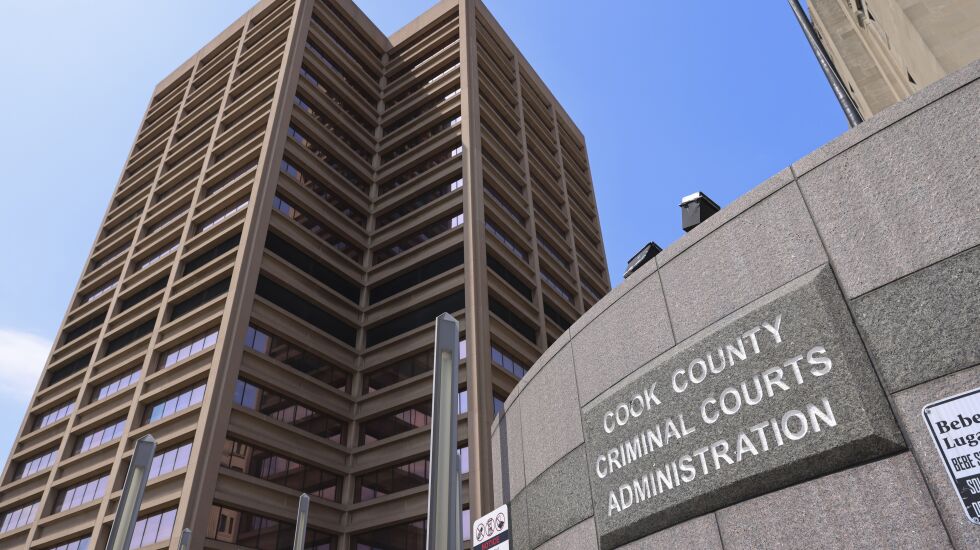
Malcolm, a Chicago man in his 20s, had a solid job and was proud he could provide for his kids. But one day his supervisor called him in and told him he was fired.
The company, a big-box retailer, had run a background check and saw Malcolm had a felony on his record. (Malcolm is a pseudonym WBEZ is using at his request to protect his identity and future employment prospects.)
Malcolm was shocked. He had been arrested for a low-level, non-violent felony about two years earlier but agreed to participate in a diversion program that would preserve his clean criminal record and keep the felony off of it. There had been some sort of error.
It was not an anomaly. Cook County has been wrongly putting felonies on the records of people in some diversion programs for at least three years.
With the erroneous felony on his record, Malcolm’s life quickly unraveled. Without work he could not afford housing and began sleeping on the street, tucked into the doorways of buildings. He’d built his identity around being a provider for his family, and now he was having trouble even feeding himself. He slipped into a deep depression.
“I wouldn’t wish that on nobody,” he said.
Diversion programs are a pact — a promise of sorts.
The “second chance program,” which Malcolm agreed to be a part of, is available to people charged with nonviolent offenses who have no previous felony record.
In return for keeping a felony off his record, Malcolm agreed to probation. He had to do monthly drug tests, complete 80 hours of community service, regularly meet with his probation officer and stay employed.
He’d kept his end of the bargain and was devastated when he found out that the county had not. He called his lawyer, assistant Cook County public defender Amber Klinge.
Klinge quickly discovered that her other clients in the “second chance” diversion program also had felonies wrongly stamped on their records. So did her clients in another diversion program, the “first time weapon’s offender program,” for non-violent weapon possession charges.
“It made me feel really physically ill,” Klinge said.
Documents obtained through a public record’s request show the Public Defender’s office has been trying to get the office of Cook County Clerk of Court Iris Martinez to fix the problem since at least September of 2022.
“Until and unless this happens, all persons in Cook County who have been given the opportunity to find jobs, housing, and education without the stigma of a felony conviction are being denied that chance,” public defender Sharone Mitchell, wrote in a follow-up letter to clerk of court staff in February of 2023.
But there has been confusion, and lots of back and forth between county officials, about who was responsible for the problem and how to fix it.
Mitchell’s February letter summarized a meeting in which Martinez’s office committed to creating a new way to enter data and correct the issue. Contacted for this story, James Murphy-Aguilú, the chief of staff for Martinez, originally agreed their office was responsible and he claimed they’d fixed it.
But when WBEZ asked him about Malcolm’s record, which still shows a conviction, Murphy-Aguilú changed his statement.
He then pointed to Cook County Chief Judge Tim Evans as being responsible. “Ultimately, we have to take our orders from the chief judge’s office,” Murphy-Aguilú said.
Evans’ office did not respond to those accusations but now Evans and Martinez both say that since WBEZ began asking questions they’ve agreed on a solution to ensure felony records are not mis-entered.
Murphy-Aguilú said they would immediately begin the process of correcting past records, which he expected to be completed by the end of next week, but he was unable to say how many people’s records needed to be corrected. In addition, even if the county fixes the issue, the problem is expected to linger. Third parties routinely pull government records to do background checks so information about these false felonies is already out in the world, living on databases the clerk of court cannot correct.
Klinge said now when her phone rings, she always worries it’s going to be a client who has had a conviction wrongly added to their clean criminal record.
“I always answer real quick. They don’t live with a lot of extra money in their bank accounts … they don’t have a cushion. They rely on paycheck to paycheck,” she said, “And then all of a sudden, that promise is broken, all of a sudden, the rug is taken out from under them.”
Malcolm now has a new job, where he has already received a promotion. He’s been able to get housing again and steadily rebuild his life. When he talks about it, he smiles.
“I haven’t been going through my depression issues ever since I got this job. I’ve been at peace within myself, “ he said.
But the peace is precarious. Malcolm lives in terror that the false record will show back up and that he will have to start all over again.







